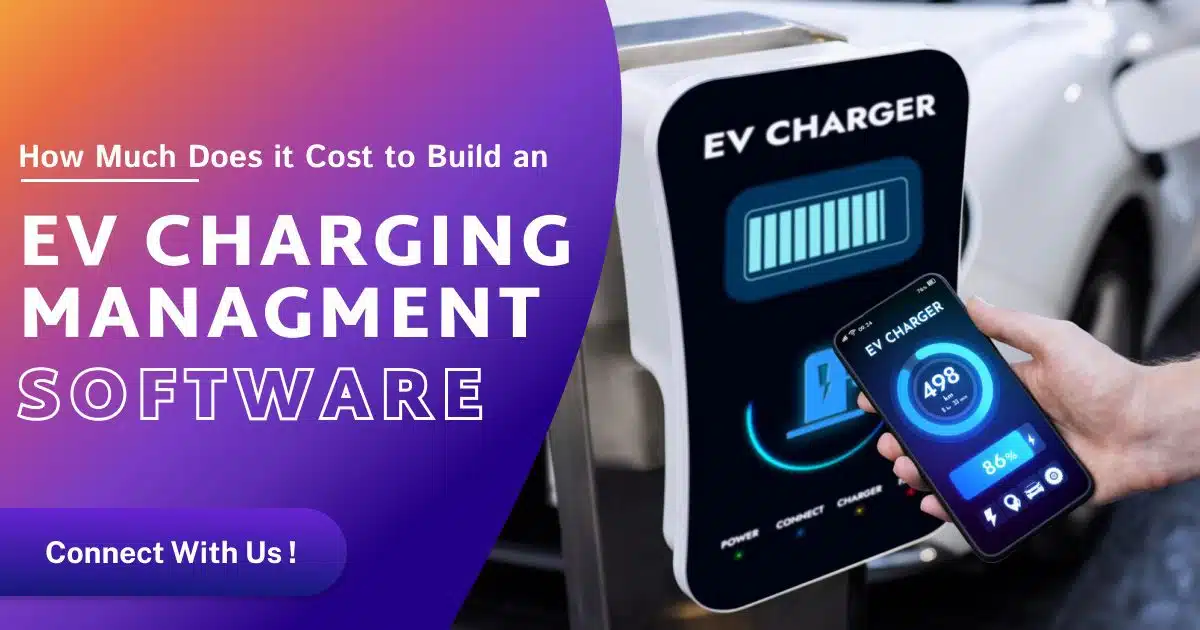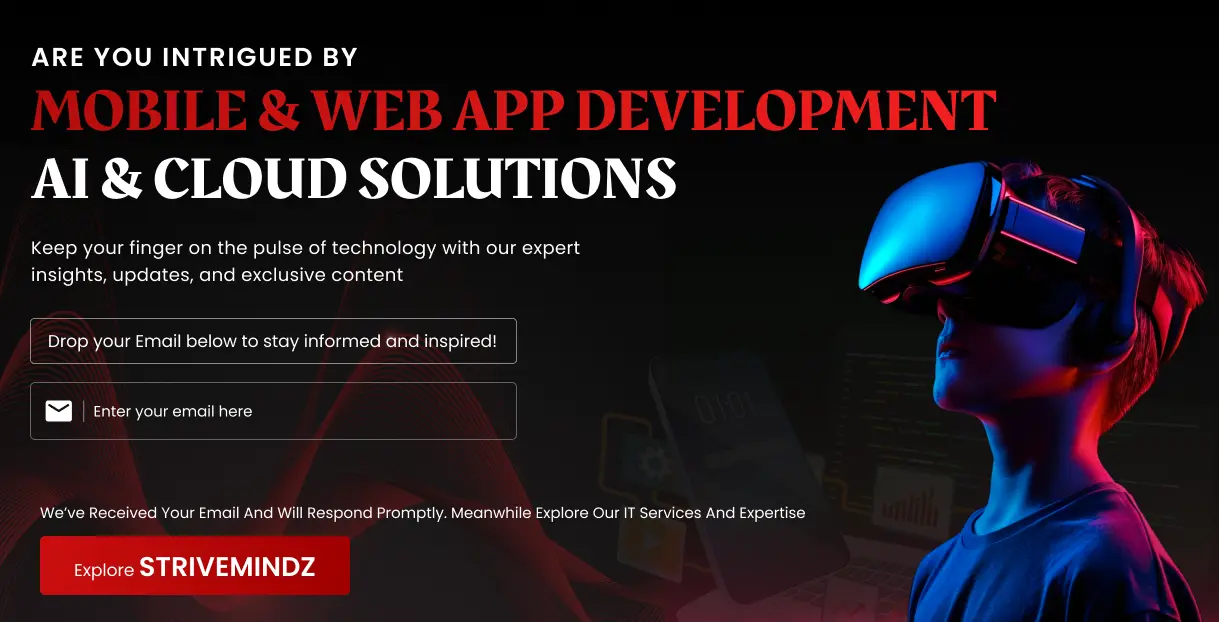How Much Does it Cost to Build an EV Charging Management Software in 2024?

The electric vehicle (EV) revolution is gaining momentum, creating a surge in demand for charging infrastructure. As a business owner looking to capitalize on this trend, you might be considering installing EV charging stations at your location. But beyond the physical hardware, you’ll also need robust software to manage these stations effectively. This is where EV charging management software comes in.
This comprehensive guide will delve into the world of EV charging management software, exploring its functionalities, the factors impacting development costs, and strategies for optimizing your budget.
What is EV Charging Management Software?
EV Charging Management Software is a type of software used to manage and optimize the charging process for electric vehicles (EVs). It helps EV owners and operators monitor and control the charging of their vehicles, providing real-time data on charging station availability, charging speeds, and energy consumption. This software plays a crucial role in ensuring that EVs are charged efficiently and helps reduce waiting times at charging stations.
In essence, EV charging management software simplifies and streamlines the entire EV charging experience, for both you as a business owner and the EV drivers using your stations.
Why is it Important?
Here’s why EV charging management software is important for businesses looking to invest in EV charging infrastructure:
- Increased Efficiency: Imagine managing multiple charging stations without the software. It would be a logistical nightmare! The software automates many tasks, such as monitoring station status, billing users, and generating reports. This frees up your staff’s time to focus on other important aspects of your business, leading to increased overall efficiency.
- Enhanced User Experience: EV drivers expect a smooth and convenient charging experience. The software facilitates this by providing features like station location maps, user authentication for secure charging sessions, and real-time progress monitoring. This translates to happy customers who are more likely to return to your location and recommend it to others.
- Improved Revenue Generation: The software allows for flexible pricing structures. You can set different rates based on factors like time of day, power consumption, or even offer membership programs for frequent users. Additionally, automated billing ensures you receive timely payments for charging sessions, maximizing your revenue potential.
- Data-Driven Decision Making: The software doesn’t just manage your charging stations; it provides valuable insights. By analyzing usage patterns and station performance data, you can make informed decisions about your charging network. This could involve optimizing station placement, identifying peak charging times to adjust pricing strategies, or planning for future infrastructure expansion.
- Future-Proofing: The EV market is rapidly evolving. The software you choose should be adaptable and scalable. A good EV charging management software is designed to integrate with new technologies and accommodate growth in your charging network. This ensures you’re not locked into a system that becomes obsolete as the EV landscape changes.
By investing in EV charging management software, you’re not just acquiring software; you’re investing in the future of your business. It allows you to provide a superior service to EV drivers, optimize your operations, and maximize your return on investment in the ever-growing EV market.
EV Charging Software Market Statistics
The EV charging software market is experiencing significant growth, driven by the rising adoption of electric vehicles (EVs) globally. Here are some key statistics to consider:
- Market Size: According to Market Research Future, the EV charging management software market size was valued at USD 928.69 million in 2022 [1].
- Projected Growth: The same report predicts the market to reach a staggering USD 10,073.51 million by 2032, reflecting a Compound Annual Growth Rate (CAGR) of 26.2% [1]. This indicates a rapidly expanding market with substantial potential.
- Regional Dominance: As of 2022, Europe held the largest market share, valued at around USD 0.42 billion [2]. This dominance can be attributed to strong government incentives promoting EV adoption and investments in charging infrastructure. However, the Asia Pacific region is expected to witness the fastest growth due to its large and densely populated urban areas with increasing EV adoption.
Features of EV Charging Management Software
EV charging management software offers a wide range of functionalities to optimize your charging network operations and enhance the user experience for EV drivers. Here’s a breakdown of some key features to consider:
Station Management:
- Real-time Monitoring: Gain instant insights into the status of each charging station, including availability, power usage, and whether they’re currently in use.
- Remote Control: The ability to remotely control functions like starting, stopping, or resetting charging sessions for better operational efficiency.
- Alerting and Diagnostics: Receive real-time notifications for potential issues like malfunctions or equipment failures, allowing for prompt intervention and minimizing downtime.
- Historical Data Analysis: Analyze past usage patterns to identify peak charging times, optimize station placement, and inform future infrastructure decisions.
User Management:
- Station Locator: An intuitive interface for users to easily find charging stations near them, including real-time availability information.
- User Authentication: Secure login systems for authorized users to access charging stations and manage their charging sessions.
- Reservation System: Allow users to reserve charging slots in advance, especially for high-demand locations, ensuring a seamless charging experience.
- Charging Session Monitoring: Users can remotely monitor the progress of their charging session, including estimated completion time and remaining battery percentage.
Billing and Payment Processing:
- Flexible Pricing Structures: Set different rates based on factors like time of day, power consumption, or offer membership plans for frequent users.
- Automated Billing: Generate automatic invoices for charging sessions and ensure timely payments.
- Multiple Payment Gateway Integration: Integrate with various payment gateways to offer users a variety of convenient payment options.
- Transaction History: Allow users to access their past charging history, including transaction details and costs.
Energy Management:
- Load Balancing: Distribute power efficiently across multiple charging stations to avoid overloading the grid and ensure smooth operation.
- Smart Charging: Schedule charging sessions during off-peak hours when electricity costs are lower, optimizing energy usage and reducing operational costs.
- Integration with Renewable Energy Sources: Connect your charging stations with renewable energy sources like solar panels to power your operations sustainably.
Reporting and Analytics:
- Comprehensive Reports: Generate detailed reports on usage patterns, revenue generated, station performance, and user behavior.
- Data Visualization: Visualize data through user-friendly dashboards and charts for easy interpretation and informed decision-making.
- Customizable Reporting: Tailor reports to meet your specific needs and track key metrics to measure the success of your charging network.
Additional Features:
- Mobile App Integration: Offer a user-friendly mobile app for convenient access to station locations, charging session management, and payment options.
- Accessibility Features: Ensure your software is accessible to users with disabilities, complying with relevant regulations and promoting inclusivity.
- API Integration: Integrate the software with existing business systems like accounting or customer relationship management tools for streamlined data management.
- Cybersecurity Measures: Implement robust security protocols to protect user data and ensure the secure operation of your charging network.
By choosing EV charging management software with a comprehensive range of features, you can create a user-friendly and efficient charging ecosystem that benefits both your business and EV drivers. Remember, the specific features you require will depend on your unique needs and business model.
Type of EV Charging Management Software
EV charging management software can be categorized based on several key factors, allowing you to identify the solution that best aligns with your business needs. Here’s a breakdown of some common categories:
Deployment Model:
- Cloud-Based: This is the most popular choice due to its scalability, accessibility, and lower upfront costs. The software resides on a remote server managed by the vendor, accessible through a web browser or mobile app.
- On-Premise: This option offers greater control over the software and data security. The software is installed on your own servers, requiring upfront investment in hardware and IT infrastructure.
Functionality Focus:
- Stand-Alone: These solutions focus solely on managing your charging stations, offering core functionalities like station monitoring, user authentication, and billing. Ideal for businesses with a dedicated charging network and no need for integration with other systems.
- Integrated: These software integrate with your existing business systems like accounting, CRM, or building management tools. This provides a more comprehensive solution, streamlining data management and operations. However, integration might require additional development effort.
Target User:
- Fleet Management: Designed for managing electric vehicle fleets, offering functionalities like route optimization, driver behavior analysis, and energy consumption tracking. Ideal for businesses with large EV fleets, like transportation companies or delivery services.
- Public Charging Network Management: Caters to businesses managing public charging networks. These solutions offer features like station locator apps for users, real-time availability information, and public payment processing. Suitable for charging station operators, municipalities, or businesses offering public charging services.
- Workplace Charging Management: Designed for businesses with charging stations for employees. They offer functionalities like user access control, reservation systems, and employee billing options. Ideal for companies and organizations promoting employee EV adoption.
By understanding these categories and considering your specific needs, you can make an informed decision about the most suitable EV charging management software for your business. Don’t hesitate to consult with software vendors and request demos to gain a deeper understanding of their features and functionalities.
Factors Affecting the EV Charge Management Software Development Cost in 2024
Developing robust EV charge management software requires careful consideration of various factors that influence the overall cost. Here’s a detailed breakdown to help you estimate your project budget:
Development Complexity:
- Feature Set: The number and intricacy of features directly impact development time and costs. A basic system offering core functionalities like station monitoring and user authentication will be more affordable than software crammed with advanced features like:
- Dynamic pricing algorithms
- Reservation systems
- Multi-language support
- Fleet management tools (if applicable)
- Advanced reporting and analytics
- Customization: Highly customized software tailored to your specific needs will require more development effort. Off-the-shelf solutions with basic functionalities might be a quicker and cheaper option initially but may lack the flexibility to adapt to your evolving requirements.
Read also: Custom Software Development: Cost, Features, And Key Benefits in 2024
Integration with Existing Systems:
- Existing Infrastructure: Integrating the software with your existing business systems like accounting software, CRM tools, or building management systems adds complexity and cost. The level of integration required, and the need for custom APIs or data connectors will significantly influence the budget.
- Third-Party Services: Connecting the software with third-party services like payment gateways, energy management platforms, or mapping APIs might require additional development or subscription fees.
Scalability and Future-Proofing:
- Scalable Architecture: Building software that can accommodate future growth in your charging network and integrate with emerging technologies incurs additional upfront costs. However, in the long run, it ensures cost-effectiveness as your business expands and your charging infrastructure evolves.
- Modular Design: A modular design allows for adding new features and functionalities in the future without extensive code rewrites. This minimizes development costs down the line, making the software adaptable to changing needs.
Additional Cost Considerations:
- Development Team: The experience and location of your chosen development team significantly impact costs. Hourly rates for developers can vary depending on their skillset and geographic location. Here’s a breakdown to consider:
- Experienced EV Charging Software Developers: They may come at a premium but can ensure a higher quality product, potentially saving costs through their expertise and ability to avoid pitfalls.
- Offshore Development Teams: Can offer competitive rates but might have communication challenges or time zone differences to navigate.
- Freelancers: Can be a budget-friendly option, but requires careful selection to ensure they possess the necessary skills and experience for your project.
- Project Management: Effective project management is crucial for staying within budget and on schedule. This can involve hiring a dedicated project manager or allocating these responsibilities to your existing team.
- Development Methodology: Agile development methodologies that prioritize iterative development and continuous feedback loops help identify potential issues early and reduce rework, minimizing costs. Traditional waterfall methodologies might be more upfront intensive but can be suitable for projects with clearly defined requirements from the outset.
Understanding these factors empowers you to develop a realistic budget for your EV charge management software and make informed decisions about the features and functionalities that align best with your business goals.
Remember, the cheapest upfront option might not always be the most cost-effective in the long run. Consider factors like scalability, future-proofing capabilities, and the long-term value proposition when making your investment.
EV Charging Management Software Development Cost Estimates: A Ballpark Range
While providing a definitive cost is difficult due to project specificities, here’s a ballpark range to consider:
- Basic System: $10,000 – $25,000
- Mid-Range System: $40,000 – $150,000
- Advanced System with Customization: $150,000+
Remember, these are just estimates. The actual cost of developing your EV charging management software will depend on the specific factors outlined above.
Choosing the Right Development Partner for EV Charging Management Software
Developing robust EV charging management software is crucial for capitalizing on the burgeoning electric vehicle (EV) market. However, navigating the development process requires a skilled partner. Here’s a guide to help you select the right development team for your project:
Expertise in EV Charging Software Development:
- Track Record: Look for a development team with a proven track record in building EV charging management software. This experience ensures they understand the specific functionalities, industry standards, and security protocols required for your project.
- Technical Skills: The team should possess expertise in relevant technologies like cloud computing, mobile app development, and integration with charging station protocols (OCPP).
Read also: Benefits of Outsourcing Software Development
Communication and Collaboration:
- Clear Communication: Choose a partner who prioritizes clear and consistent communication throughout the development process. This ensures you stay informed and can provide timely feedback.
- Agile Methodology: Consider a development team experienced in agile development methodologies. This allows for iterative development, enabling you to adapt and refine the software based on your evolving needs.
Project Management Capabilities:
- Dedicated Project Manager: Having a dedicated project manager ensures smooth execution and keeps the project on track, within budget, and meeting deadlines.
- Transparent Reporting: Regular progress reports and clear documentation are essential for maintaining transparency and understanding the development process.
Cost and Value Proposition:
- Competitive Rates: Compare quotes from several developers to ensure you’re getting a fair price. However, don’t solely focus on the cheapest option.
- Long-Term Value: Consider the partner’s ability to provide ongoing support, maintenance, and future updates as your needs evolve. The cheapest option might not be the most cost-effective in the long run.
Additional Considerations:
- Company Culture: Choose a development team with a culture that aligns with your own. A collaborative and innovative environment can foster creativity and lead to a better end product.
- Location: While geographic location can impact cost, consider factors like time zone differences and potential communication challenges when working with offshore teams.
Conclusion
EV charging management software is an essential tool for businesses looking to capitalize on the growing EV market. By understanding the various factors impacting development costs and implementing cost-saving strategies, you can invest in a solution that aligns with your budget and business goals. Remember, the most cost-effective solution isn’t always the cheapest upfront. Consider the long-term value proposition, scalability, and future-proofing capabilities when making your decision.
Developing robust EV charging management software can be a game-changer for your business, attracting EV drivers, streamlining operations, and generating additional revenue streams. With careful planning and informed decision-making, you can navigate the development process and establish a future-proof charging ecosystem that positions your business for success in the electrifying world of transportation.
What is EV charging management software?
EV charging management software is a suite of tools that helps businesses manage their network of charging stations. It provides functionalities like station monitoring, user authentication, billing, data analysis, and integration with other systems.
Why is EV charging management software important?
This software improves efficiency, enhances the user experience, increases revenue generation, facilitates data-driven decision making, and future-proofs your business for the growing EV market.
Who uses EV charging management software?
Businesses and organizations with electric vehicle charging stations can benefit from this software. This includes companies offering public charging networks, workplaces with employee charging facilities, and operators of fleet EV charging infrastructure.
What features are included in EV charging management software?
Features can vary depending on the software, but common functionalities include station monitoring, user management, billing and payment processing, energy management, reporting and analytics, mobile app integration, and security measures.
Can EV charging management software integrate with other systems?
Yes, many software options integrate with existing business systems like accounting software, CRM tools, or building management systems. This streamlines data management and operations.
Cloud-based vs. On-premise software: Which is better?
Cloud-based software offers scalability, accessibility, and lower upfront costs. On-premise software provides greater control and security but requires investment in hardware and IT infrastructure. The best choice depends on your specific needs and priorities.
How much does it cost to develop EV charging management software?
The cost depends on factors like features, complexity, customization, integration needs, and the development team’s experience. Costs can range from $10,000 for basic systems to over $150,000 for advanced customized solutions.


